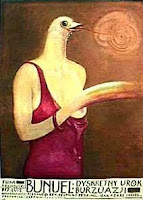
It's fun to consider works of art in historical context, and The 5,000 Fingers of Dr. T flies in the face of the era in which it was created, the Eisenhower 50's. This was a time of post-war prosperity, a forced return to normalcy where blandness and routine was considered ideal (compared to a world in flames a few years earlier, completely understandable). But this was
But we don't live in either of those eras, so we must judge the flick as a stand alone piece of work (if such a thing is possible; I'll get to that later). The one absolute stand-out is the design with its proto Frank Geary curvilinear Terwilliker Institute. They didn't half-ass it. Twisty walls, giant pointy fingers, cumbersome musical instruments that dripped from Dali's brush, a ladder to nowhere. It's a real-life Dr. Seuss (pronounced "soice," like "rejoice," thanks, J) that contemporary attempts of filming his work failed at. Like The Wizard of Oz, the dream worlds, despite their dangers ("disintegrated, atom by atom"), both outshines and shines a light upon the real one. What I found myself doing, however, was admiring the obvious labor that went into the design and construction of the sets and immediately thinking that now some poindexter with a Mac can crank the same thing out in an hour. That's where modern filmmaking imposes its will (and invariably sucks the life out of) on the way viewers view the classics.
OK, so being forced to practice the piano isn't fighting against worldwide tyranny (or is it?), but you pick your battles. It's enough for it to become a life-or-death struggle against a dictatorship ("very atomic!") and search for a father-figure, for an impressionable scamp.




